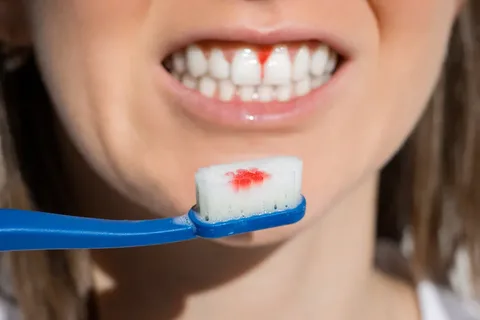Ever noticed a pink tinge when you spit after brushing? A little bit of blood might not seem like a big deal, but it can be your gums’ way of waving a red flag. Many people ignore occasional bleeding, thinking it’s normal, but healthy gums shouldn’t bleed at all. Whether it happens every once in a while or every single time you brush, there’s always a reason behind it—one you definitely shouldn’t overlook.
Bleeding gums can be a sign of something as simple as brushing too hard, or it could point to a more serious issue like gum disease. The good news? With proper care, most causes of bleeding gums can be managed or even reversed. So, let’s dive into what’s behind those bleeding gums and what you can do to stop it.
Searching for a committed clinic to provide exceptional dental care? Look no further than the best dental clinic in Dubai.
Common Causes of Bleeding Gums
1. Gingivitis: The First Warning Sign
Gingivitis is the earliest stage of gum disease, and one of its main symptoms is bleeding gums. Plaque buildup along the gumline leads to inflammation, making gums red, swollen, and prone to bleeding, especially when you brush or floss. The best part? Gingivitis is reversible with good oral hygiene.
2. Brushing Too Hard or Using the Wrong Toothbrush
Believe it or not, being too aggressive with your toothbrush can do more harm than good. Hard bristles and excessive pressure can wear down gum tissue and cause irritation. Switching to a soft-bristled toothbrush and using gentle, circular motions can help prevent damage.
3. Flossing Inconsistently or Incorrectly
If you’ve just started flossing or don’t do it regularly, you might notice some bleeding at first. Your gums need time to adjust, and after a few days of consistent flossing, the bleeding should stop. However, if it doesn’t, an underlying issue could be to blame.
4. Poor Diet and Vitamin Deficiencies
Your gums need proper nutrients to stay healthy. A lack of vitamin C or vitamin K can make them more susceptible to bleeding. Eating a balanced diet rich in leafy greens, citrus fruits, and other nutrient-packed foods can improve gum health.
5. Medications That Affect Blood Clotting
Certain medications, like blood thinners, can make your gums bleed more easily. If you’ve noticed increased bleeding after starting a new medication, it’s worth discussing with your doctor or dentist to find the best approach.
How to Stop Your Gums from Bleeding
1. Improve Your Oral Hygiene Routine
Brushing twice a day with fluoride toothpaste and flossing daily are your first lines of defense. Using an antibacterial mouthwash can also help keep plaque under control and reduce gum inflammation.
2. Be Gentle With Your Gums
Ditch the hard-bristled toothbrush and switch to a soft one. Use gentle strokes instead of scrubbing aggressively. When flossing, glide the floss carefully instead of snapping it between teeth to avoid damaging your gums.
3. Eat a Gum-Friendly Diet
Load up on foods rich in vitamins C and K, like oranges, strawberries, kale, and spinach. Avoid excessive sugar and processed foods, which can contribute to plaque buildup.
4. Stay Hydrated and Quit Smoking
Drinking plenty of water helps wash away food particles and bacteria, keeping your mouth cleaner. Smoking, on the other hand, weakens your immune system and makes it harder for your gums to heal—so quitting is one of the best things you can do for your oral health.
5. Visit Your Dentist Regularly
If bleeding gums persist despite your efforts, it’s time to see a dentist. Professional cleanings remove stubborn plaque and tartar that you can’t reach at home, and your dentist can check for signs of gum disease or other underlying issues.
Final Thoughts
Bleeding gums aren’t something to ignore. Whether it’s a sign of gum disease, poor brushing habits, or a vitamin deficiency, the sooner you address the issue, the better. By improving your oral hygiene, making small changes to your diet, and getting regular dental check-ups, you can keep your gums healthy and prevent more serious problems down the road. So, next time you see a little blood in the sink, take it as a cue to show your gums some extra care!
Seeking to fill that tooth gap you have? Highly experienced specialists at the best dental implant clinic in Dubai will provide exceptional dental care.

